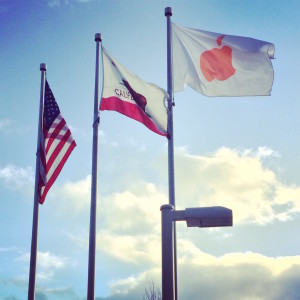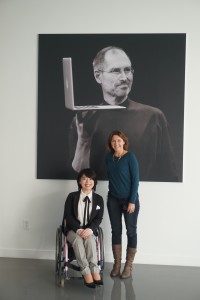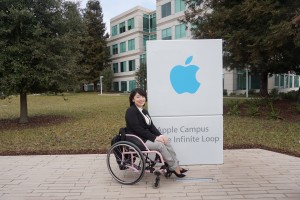この記事は次の言語でも読めます:日本語

Apple is one of the major high-tech companies that continuously captures the world’s attention.
Especially after iPhone was first released to the world, all generations went crazy and queued up all night in front of Apple stores to get their hands on the carefully designed pieces of art.
Every time Steve Jobs, and more recently Tim Cook, introduces Apple’s new products, all media channels around the world fill up with news about Apple.
I had been wondering why Apple gets so much attention from people around the globe.
I think I found a few reasons after meeting with Ms. Sue Booker, who works on Siri Accessibility at Apple’s headquarters.
Sue studied Industrial Design at the University of Michigan after starting in Architecture at Cornell University in upstate New York.
After graduating she moved to California and has been working as a User Experience designer and manager in the high-tech industry ever since.

The most surprising fact I learned from meeting with Sue, was that Apple had an accessibility group as far back as 1984.
It was a small team then, but paved the way for many advances we see today.
Sue and I talked in general terms about the importance of inclusive design, accessibility-friendly architecture, and how important it is for people with disabilities to be able to work and have equal opportunities.
In Japan, a lot of new buildings are built and many products are released every year.
Some of them are really stylish and fancy, but most are not really designed to be accessible.
That makes me sad.

I talked about the employment issues for people with disabilities in Japan, which is my research topic.
When we, Japanese people with disabilities, apply for a job, we are asked to submit a copy of our ID (for a person with a disability),
so that the company can count how many employees with disabilities they have and declare the number to the government to meet the quota.
This is required by the Employment Law in Japan.
However, due to the quota system, people with disabilities have had various kinds of challenges in finding a job and developing a good career.
To American people, the process in Japan seems very interesting.
They don’t have the same kind of ID, which is used in Japan, and also don’t need to disclose their disabilities if they choose not to.
ADA prohibits the company from asking them, so it’s up to a candidate if he or she wishes to disclose his or her disability.
When I talked about the hiring process in Japan, Sue was surprised that it was difficult for someone with a disability to be hired, even if their disability didn’t affect their ability to perform that job.
Many companies in Japan create separate job positions for candidates with and without disabilities.
Usually those job positions for candidates with disabilities are very limited and less skilled.
These lower expectations for people with disabilities feels unfair to me.
There are not many choices to begin with, and no matter what positions candidates with disabilities apply for, employers ask the applicants about their disabilities as well as ask them to submit an ID (for persons with disabilities).
If the disability is hidden, a candidate may choose not to mention it, and employers might not notice.
However if they do this, they are unable to request any special accommodations to do their job.
Because of this, most people with disabilities choose to disclose.
To be continued…
